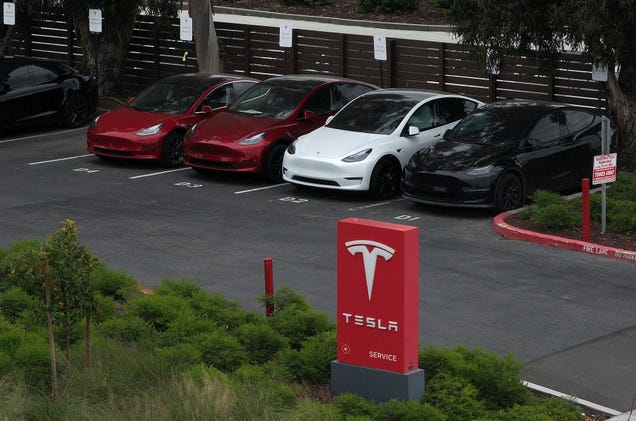

Stinson Carter
With all the rugged charm and off-road chops of a Jeep and 21 miles of electric-only range on a charge, the new 4XE is a symbol of evolution for a model prized for its loyalty to the past.
Even Jeep purists will enjoy the 470 pound-feet of torque, the 375-horsepower, and the possibility of whisper-quiet off-roading. But you better be willing stay close to the cord to fully reap the benefits of the 4XE.

Stinson Carter
I was cruising down a city street in the new 4XE when I went under a freeway viaduct that I pass all the time without giving it a second thought. But behind the wheel of the Jeep, the world doesn’t look the same. And what I saw yesterday as an overgrown urban no-man’s-land suddenly looked more like an off-road wonderland. I made a hard right turn, and within seconds the e-infused Rubicon was devouring the ruts, rocks and mud in the shadow of the freeway overhead.
Over the next few days, I would come to realize that the things I would normally avoid at all costs become opportunities for fun in the 4XE. And no press fleet Jeep would ever be returned by me without mud on it.
Performance

Stinson Carter
The 4XE comes at a premium of about $7,000 over the gas-only counterpart. There are three driving modes: Hybrid Mode blends electric and gas, Electric Mode allows you 21 miles on a charge, and E-Save Mode uses only gas so you can save the battery for later. In theory, if you can stay plugged at home and at work, you could operate it with almost no gas if you limit yourself to the 21-mile all-electric range. In practice, I found that to be a challenge.
The 4XE charges in 2 hours on a Level 2 (240v) outlet, and 12 hours on a Level 1 (110v) outlet. When I set off on a trip with a 98% charge, I was surprised by how quickly the battery drained. I drove two blocks and it was down to 88%. After ten minutes on the freeway, it was down to zero, and I got 18.5 miles per gallon from then on.

Stinson Carter
I know the massive Rubicon tires didn’t help with efficiency, but I was a tad disappointed to only get 300-ish miles on a full tank and a full battery. The stated mpg of the gas engine is a combined 20mpg, while the gas-powered 4-cylinder and 8-cylinder versions get 22mpg and 21mpg, respectively.
If you can charge the 4XE daily, I see the value. But if you’re mainly driving longer distances, I could see the plug-in aspect become a frustration if you’re focused on efficiency. Ironically, I think the best argument for the 4XE isn’t efficiency, but performance.

Stinson Carter
It’s a very fast Jeep, and I took an owner of an all-gas Jeep for a ride and he was stunned by the way the 4XE’s torque and horsepower made it feel sporty in traffic. And you don’t have to wait on higher RPM’s for that torque––it’s right there from the start.
It’s also very cool to slow down and realize that it’s as quiet as a golf cart at low speeds. And the fact that you can traverse a boulder field or ford a river in it without a gas motor is a major selling point. You wouldn’t want a gas-generator outside your tent, and with the 4XE you can also enjoy nature without noise pollution.
Aside from the noise, there’s also more precision of power delivery at low speeds with electric, so the application of power in a technical situation seems far less brute than internal combustion, and far more dialed-in. When you need to go slowly over a rock, you’re not going to lurch over it by accident. Which makes it all the more clear that this is a vision of Jeep’s future.
Style and Design

Stinson Carter
The best thing about the design of the 4XE is that you don’t really notice much difference aesthetically between it and its gas-powered brethren. Nothing to detract from its iconic Jeep looks, other than some cool electric-blue accents like tow hooks and hood paint to distinguish it. And the charging port is well-concealed in front of the driver’s side door.
There are a few elements of design that aren’t specific to the 4XE that I want to mention. First, the controls like the dual shifters for on and off-road are all rugged and tactile. The mechanical feel of the switches and buttons beg to be touched. There’s no place to put your phone for easy access or looking at your GPS, but I suppose that could make you a better human over time.
The newly-designed soft top is extremely easy to remove. That said, I may have missed a feature of the soft top’s rear window, but trying to access the back of the Jeep with the soft top on was like trying to walk through the bottom half of a Dutch Door. And finally, for a vehicle that kicks as much ass on rain-flooded streets as a Wrangler Rubicon Unlimited, I was annoyed that the rain gutters drain inside and onto the floor mats when you open the doors.

Stinson Carter
Conclusion
I don’t think I can sum this up without mentioning the price. The Jeep Wrangler Unlimited Rubicon 4XE that I tested came to a total of $62,660 MSRP, which seems a bit steep.
I went into this test drive focused on efficiency, only to be disappointed. But when I focused on performance, I had a blast. If you want the most capable Jeep available today and money is no object, then you need the 4XE. If you love the look of a Jeep and are looking at the 4XE as the guilt-free version, then you need to have serious charging discipline to fulfill that promise.

Stinson Carter
It is a bold step forward for a classic, but its biggest selling point is not that it’s such a great hybrid, but that it’s such a great Jeep.







